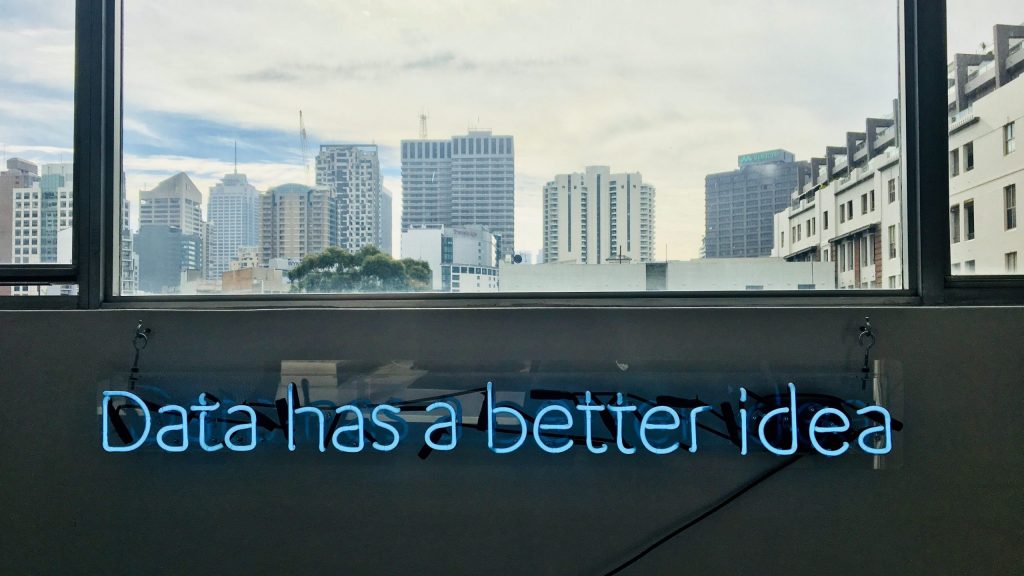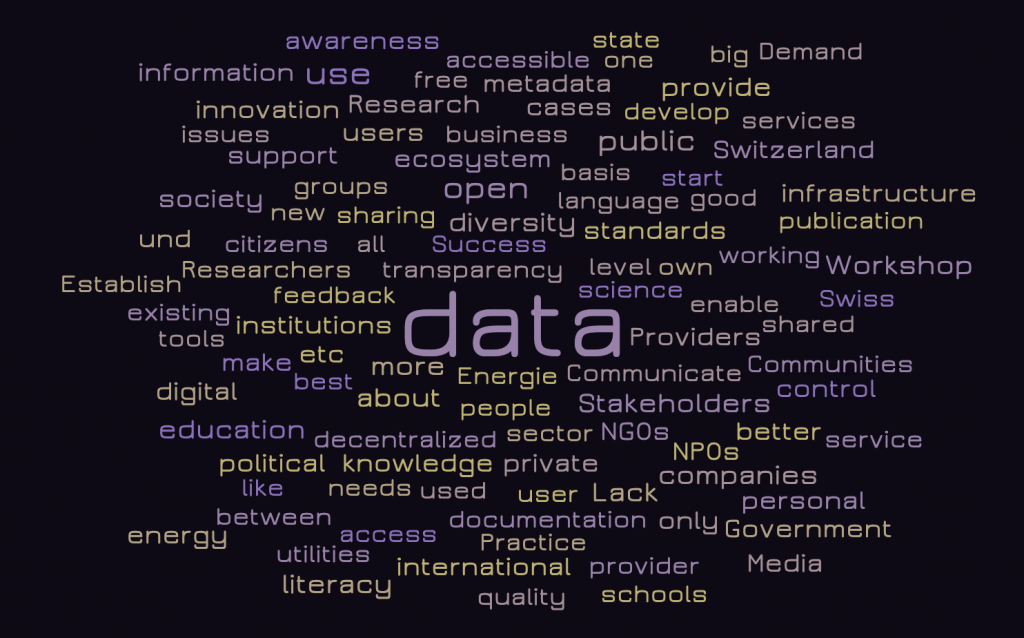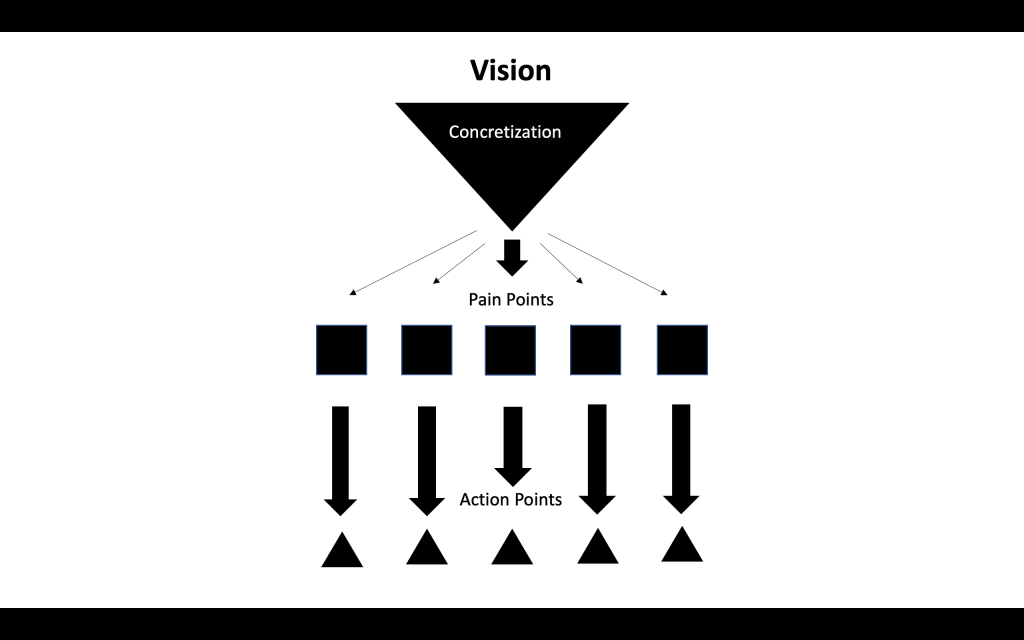Zeitfresser Datenbeschaffung: open by default bitte

Dieser Text von Dr. Vera Eichenauer erschien zuerst in der Kolumne «Das letzte Wort» im Bulletin der Schweizerische Akademie der Geistes- und Sozialwissenschaften.
Meine internationalen und Schweizer Gesprächspartnerinnen zeigen sich vielfach überrascht, wenn ich berichte, dass die Schweiz, was die Offenheit ihrer Regierungsdaten (Open Government Data, OGD) anbelangt, deutlich hinter der Weltspitze liegt: im Global Open Data Index der Open Knowledge Foundation belegt die Schweiz nur den 47. Rang, im Open Data Inventory (von 2018) den 33., im Open-Data-Barometer immerhin den 22. – allerdings im letztgenannten Index nur mit der Hälfte der Punkte von Grossbritannien und hinter Frankreich, Deutschland und der Tschechischen Republik. Dabei handelt es sich um die Offenheit von Daten, die öffentliche Verwaltungen auf Bundes-, Kantons- und Gemeindeebene bereits sammeln, bezahlt mit Steuergeldern.
Als Staatsbürgerin empören mich der beschwerliche Zugang zu öffentlichen Daten und deren schlechte Dokumentation. Daten sind eine wichtige Grundlage für die Meinungsbildung und der Ausgangspunkt für Entscheidungen – von Regierungen ebenso wie von Bürgerinnen und Bürgern. Dies zeigt sich gerade während der aktuellen Covid-19-Krise. Die an sich verbindliche Open-Government-Data-Strategie, Teil der Legislaturplanung 2019–23, muss nun zügig umgesetzt werden.
Als Forscherin sind die fehlenden oder unsystematischen Informationen über vorhandene Daten vor allem ein Zeitfresser: Ich brauche viel Zeit um herauszufinden, welche Daten es überhaupt gibt und noch mehr Zeit, um diese zu beantragen, auf Qualität, Zweckmässigkeit und Kombinierbarkeit zu überprüfen.
Es braucht einen mentalen Wandel
Eine zentrale und öffentliche Dokumentation von bereits verfügbaren Datensätzen, mitsamt ihren Eigenschaften, Zugangsbedingungen und -prozessen könnte den Zeitaufwand für Forschende enorm reduzieren. Dies fördert den gleichberechtigten Datenzugang für jüngere oder weniger vernetzte Nachwuchsforschende und ausländische Forscherinnen. Ein einfacher Datenzugang fördert zudem die Reproduzierbarkeit von Forschungsergebnissen.
Es gehört niemand an den Pranger gestellt: Überall wird fleissig digitalisiert. Wichtig ist der mentale Wandel hin zum Primat der Offenheit und Transparenz (open by default). Neue Verwaltungs- und Forschungsdaten als offene Daten zu publizieren, verursacht minimalen Aufwand – anders das Aufbereiten alter Datensätze. Dank solcher Offenheit steht den Sozial- und Geisteswissenschaftlerinnen und auch nicht akademischen Analystinnen und Anwenderinnen von Daten mehr Zeit für ihre Kernarbeit zur Verfügung: neue Fragestellungen zu untersuchen und Erkenntnisse zu generieren.
Wenn Publikationen (hoffentlich bald Open Access) die akademische Währung und Innovationen das Gold der Schweiz sind, dann sind qualitativ hochstehende Daten aus einem institutionell, kulturell und geografisch so vielfältigen Land wie der Schweiz ein quasi unerschöpflicher Rohstoff, den es nicht zuletzt für unsere Forschenden zu heben gilt. Ich wünsche mir dafür «volle Kraft voraus», da- mit ich mehr Zeit damit verbringen kann, Daten zu analysieren, anstatt sie zu sammeln und aufzubereiten.
Wem gehört Züri?
Wem gehört Züri? Unterstütze die Recherchearbeit von www.tsri.ch und die Debatte zur Öffentlichkeit des Grundbuches. Für mehr Transparenz über Besitzverhältnisse! https://tsri.ch/grundbuch-recherche/ #transparency
Smart Cities on the Rise
Cities take their innovation into their own hands!
Three online hackathons in a row, tackling different aspects of urban life at different cities scales, show us how smart cities will be developed locally, by and for their inhabitants, with Open Data as raw material for reflection and solutions.
The first hackathon, Smart City lab Lenzburg, will take place online on the 13th and 14th of November 2020 and is strongly anchored in the local community and it will tackle questions specific to Lenzburg: for example after a new 2000W neighbourhood was build, the following questions arose: How to optimize this new way of urban living? Which lessons can we learn? Which solutions could be adopted by the rest of the city? Another challenge will be how to reunite the different parts of Lenzburg, which were cut up by the train tracks and the highway at different moments of its historical development? Could optimizing public transport to the different neighborhoods be part of the solution? Or making initiatives and activities in different parts of the city more visible to the rest of Lenzburg? Questions also arise from the side of the city administration and services, and from the energy provider. Solutions might be digital or not, but while their starting point is local, the solutions might concern us all.
Shortly after, on the 27th and 28th of November the Shape my City – Open Data Hackdays, organized for the second year by the students of the master’s degree course in Applied Information and Data Science of the Lucerne University of Applied Science and Arts, will also take place online. For this larger touristic and academic city, one of the focuses will be to understand the needs of the different types of inhabitants, users, visitors and stakeholders of the city. How can we shape the interaction for better communication and services? And how can we incentivise behavioural changes for a more harmonious and sustainable city life? The other topics revolve around exploring the potential of the urban fabric for energy production, climate change mitigation and here too, the model role of 2000W neighborhoods.
Then, also online on the 29th & 30th April 2021, the Energy and Climate Hacks will be held as a parallel event to the Decarbonizing Cities Conference. During this event, smart urban living will be addressed through the lens of energy efficiency not only in Bern but also in some british cities, throwing a bridge between common issues and needs across borders.
The beauty of this series of events is not only that it will allow us to go deeper in the development of solutions, but also that it exemplifies how bottom-up locally embedded initiatives actually tackle global issues and how those proposals, tested at a local scale, might help our society beyond their original purpose.
These events are open and free of charge, like all our other hackdays, so take part, you too have a take on how our future smart cities should be!
Smart City lab Lenzburg 13th and 14th of November 2020
Shape my City – Open Data Hackdays 27th and 28th of November 2020
Energy and Climate Hacks 29th & 30th April 2021
Energy Data Hackdays 2020, the results!
The excitement before the new edition of the Energy Hackdays in Brugg was a bit special this year. Besides the usual sweet little heart pinch of the leap into a new group, the discovery of the challenges and the satisfaction of seeing this particular event repeating for the second time in Brugg, there was happiness but also respect about having the Energy Hackdays taking place mostly on site at the Hightech Zentrum Aarau.
So we met in person and as far as we can say, it has been worth it! 13 really ambitious and technical challenges met 85 participants who were nonetheless ambitious and highly qualified! Two big themes emerged this year and predictions based on machine learning was one of them. Predicting performance, usage patterns, anomalies or even failure, in order to plan, use and maintain infrastructure more accurately. Reaching these goals of course allows a much better resource and production management.
The other big topic covered by several challenges was the question of visualization and interfaces, especially for smart-meters: How to help users, scientists, producers or end-consumers to read flows of data and allow them to interpret and decide or react appropriately to a given data supported information? How can they analyse and control different aspects of their infrastructure or installation? Tangent to this topic were challenges that attempted to allow a market overview for the consumer, in this case the market of E-Car charging stations, or to visualize the overall live electricity consumption of Switzerland.
As far as I can judge and from what I heard from the challenge owners, the results blew us away! While the project descriptions might be a bit less accessible to the public than some from past hackdays, the approaches and results certainly correspond to a present need in the energy industry and comfort us in the conviction that hackathons and collaborative work with Open Data do support high-end innovation.
We were also very lucky to welcome the team of Campus 21 who harvested the visions of some of the participants for the future of Open Energy Data.
See you all next year!
The 13 projects developed during the hackdays
Decrease gas peak boiler runtime due to better storage operation: heat demand forecast, improved storage control, better storage operation.
PV self-consumption optimization
Evaluate and optimize trade-offs in the design of battery storage for PV systems, so our customer can select, whether they want the most economical battery solution or maximise their autarky. Our tools calculate the maximized economic benefit over lifetime.
Read your Smart Meter through the local Customer Information Interface (CII) and visualize your consumption. Design a dashboard with the most useful information.
In order to develop the GIS platform of the Swiss Federal Office of Energy (SFOE) further: Add price information to the charging stations and find the cheapest option around for electric car drivers.
Creating a platform for strategic decision making based on data from the Energy Science Center of ETH Zürich.
We analysed the charging patterns of private vs public e-cars charging stations. This could provide good hints for a further automated customer segmentation, help prediction of behavior changes for the load-curve vs renewable electricity production & help customers optimize their charging habits.
Empower the People with Smart Meter Data
Smart Meter Additional Use Cases: Novel energy certificate assesses where and how strongly building / user behaviour causes deviation from theoretical / optimum behaviour.
Machine Learning Wind Turbine Power Curve Prediction: we compared constructor provided production projections with actual production curves with the goal to improve site-specific performance prediction of wind turbines.
– Development of machine learning algorithms (or tools/aps) for improved site-specific performance prediction of wind turbines.
– Development of alternative algorithms e.g. Artificial Neural Networks
– Inputs: wind velocity, turbulence intensity, shear factor (alpha)
Help meet the Paris Convention goals to achieve net 0 by 2050, less than 2 tonnes CO2 per person! We want to raise awareness around energy use and consumption by putting Switzerland on the map at electricitymap.org and put its open data API to use.
Distributed analytics for asset management
The goal is to create a decision support tool for asset managers, using AI to predict how power transformers will fail, and what to watch out for.
Anomaly Detection in Smart Meter Data
We developed EDA and algorithms for the Anomaly Detection in Smart Meter Data challenge. We developed several approaches for detecting anomalous days based on mean and std of the readings during the day and for detecting single anomalous readings.
These models can be integrated in the second part of the challenge
MeterOS: Smart Meter Anomaly Detection
Create a model for Smartmeter Anomaly detector and their visualization.
Unleashing the Swiss Smartmeter’s CII
Empower citizens to use their energy data. Using the smartmeter’s CII beyond visualisation to steer local consumption.We developed a concept and PoC roadmap to provide a “universal” adapter from smart meters to home IoT platforms.
Opendata.ch/2020 Forum: From Data Visions to Action Points

Back in June we celebrated the 10th edition of our yearly forum. Where we talked about new data narratives and our visions for the data future. During the forum we held two workshops based on data visions to find concrete action points that we can do today to create a better (data) future.
New data visions
We called for our community to enter data visions which we then worked on in greater depth at the forum. From the 19 visions that were entered via our website, we selected eight to be treated during workshops. We are leaving the form open for entries, in case you would like to let us know about your data vision you can do so here.
You can find the notes on the eight workshops in the table below.
| Filling Female Data Gaps | A world where data is available without gender bias and gaps |
| Research Data Connectome | To connect and organize (meta)data for research sustainably across disciplines, in order to make it widely accessible, interoperable and valuable. |
| Serving, not Spying | In ten years from now, I don’t feel observed and manipulated through the Data being collected about me but I can rely on being served by data for better services, better policies and a better environment. |
| Better use of data in Switzerland 1 | Public and private sector data is open, shared, and used for public and private good within a trustworthy data ecosystem (“Swiss / European DataSpace“). |
| Better use of data in Switzerland 2 | Public and private sector data is open, shared, and used for public and private good within a trustworthy data ecosystem (“Swiss / European DataSpace“). |
| Solid basis for committed debate and innovation | Data creates a critically discussable basis for political analysis and joint shaping of our future just as they enable innovations in everyday life – free access and responsible use are indispensable for an enlightened information society. |
| Open decentralized data storage | Data is a new form of currency: It is too powerful to be controlled by centralized private entities – let’s build a decentralized system to store, share and use data. |
| Shared ecosystem of energy data in Switzerland | Data about energy production and consumption is shared openly by Swiss utility companies, promoting open innovation and helping to reach the “Agenda 2030” climate goals. |
Defining pain points and action points

From the eight visions that were proposed at the forum, seven were treated in two workshops. Unfortunately not enough people wanted to work on the vision«Large Citizen Generated Open Data Sets». However, the vision «Better use of data in Switzerland» proved to be so popular, that we had two groups working on it.
In the first workshop, the visions were first made more concrete, then the current situation was recorded and finally the pain points, i.e. the differences between vision and actual situation, were discussed and noted.
Based on these pain points, the accountable stakeholders were identified in the second workshop. Then action points were noted for these stakeholders, which they can and should address.
You can read the overview of all pain points and action points here.
Pain points
The lack of data literacy was a pain point featured in most of the workshops. The lack of education on data appears to affect many areas. A further problem is the findability and accessibility of data. Even if you find a data set you need, doesn’t mean you can easily use it and integrate it into your research or project. This again is an issue that affects the whole data ecosystem. The second workshop picked up these pain points and after trying to assess the accountability for these developed several action points.
Choosing action points
Among the action points identified in the workshops, three were selected per vision and subjected to a vote on how urgently they should be tackled. Looking at the results of the voting process the following five action points appear to be the most urgent out of the 24 submitted to voting:
- Data Literacy: Stakeholder: Institutes and Departments & Research Support: Provide Trainings and Education Sessions. (111/135 points)
- Data providers: need to provide good data publication (e.g. publish high-quality data together with metadata), and secure unified open data licences. (110/135 points)
- Political decision makers: Provide an easy to understand legal basis for clear data portability rules and for a decentralized data infrastructure (?). Enable (cantonal) pilots for digital participation. (108/135 points)
- Foster cooperation between data user and data provider. On the data user side this means education (data literacy), good use cases und sustainable data Investment (not only Dashboards). (108/135 points)
- Public institutions (libraries, archives, educational institutions, data holders): Provide Infrastructure (as an alternative to Google, Apple, Facebook, Amazon, etc.) open for everybody. (107/135 points)
- Data producers: Be transparent about known flaws in data (it’s better to state/take on than “hide”) and actively seek feedback from data users, to provide better documentation, metadata, and to be able to curate data better. (106/135 points)
Improving data literacy, better data and documentation on it, better legal conditions, better cooperation between data users and data providers and better, more open source infrastructure, is therefore what we will be working toward in the future.
Next steps
Thanks to the feedback we received, we are looking into ways to improve these priorities.
If you have an idea on how to actively tackle one of the action points mentioned above or you want to start a working group around one of these topics please let us know via info { at } opendata.ch
On our side, we are already working on data literacy with our Data Café and school of data. We are routinely bringing together data providers and data users at our Hackdays where data providers can experience first hand how their data is being used. A guide on how to (better) publish open data is something we have been thinking about for a long time. It appears it’s not only our association that sees a need for this. We will try to find capacities not only to challenge but also to support data providers as far as that is our responsibility.



